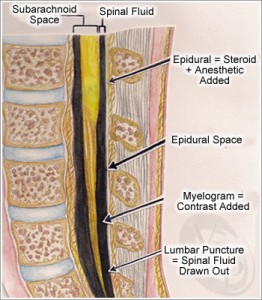A Myelogram is a procedure performed to diagnose complex abnormalities of the cervical, thoracic, or lumber spine. The procedure involves injecting water soluble, non-ionic contrast into the lumbar subarachnoid space which contains spinal fluid. X-Rays are taken first which may include upright or standing flexion and extention views. A CT scan will be performed afterwards to gather detailed cross-sectional images of the spine. Myelograms are usually done to evaluate for disc herniation stenosis, bone spurs, or arachnoiditis and are a compliment to MRI. They are also used for diagnosing spine problems in patients who cannot have an MRI for any reason.
Preparing for your Myelogram:
- A representative will contact you prior to your appointment to review your medications and complete registration.
- Be sure to let your doctor know if you are taking blood thinners (Aspirin, Lovenox, Plavix, Heparin, or Coumadin). You may be asked to stop taking this medication 5 days prior to your procedure. Also, there are certain tricyclic antidepressants that must be stopped prior to this procedure. You may resume your medication the day after your procedure.
- You will need to arrange for a driver to take you home.
- Drink plenty of fluids (water and juices only) one day prior to and the day after procedure to stay well hydrated.
- Nothing to eat or drink 2 hours prior to your appointment time.
- The procedure requires injection with contrast dye, local anesthetic and steroid. If you have an allergy to any of these medications please notify our representative, scheduler, or nurse as soon as possible.
- Myelogram patients MUST stay flat with head on a pillow for 24 hours after the procedure to avoid headaches. At home, lie on your back, side or stomach with head elevated no more than 30 degrees.
- You may walk to the bathroom and sit up to eat ONLY 5 minutes at a time.
- You may experience soreness at your injection site for up to 24 hours. This can be managed with over the counter analgesics such as ibuprofen or aspirin. Cold ice packs 3-4 times daily for several days are also effective. You may take your own pain medication if already prescribed by your referring physician, except for phenergen.
- You can return to light activity after your 24 hour bed rest period. On the third, fourth and fifth days after your procedure avoid strenuous activity or physical therapy.
If you develop fever or severe pain contact our office at 352-333-7847 (7VIP) or call your referring physician. After hours or on weekends, go to the nearest emergency room or call North Florida Regional Medical Center at 352-333-4000 and ask for the Radiologist on call.


